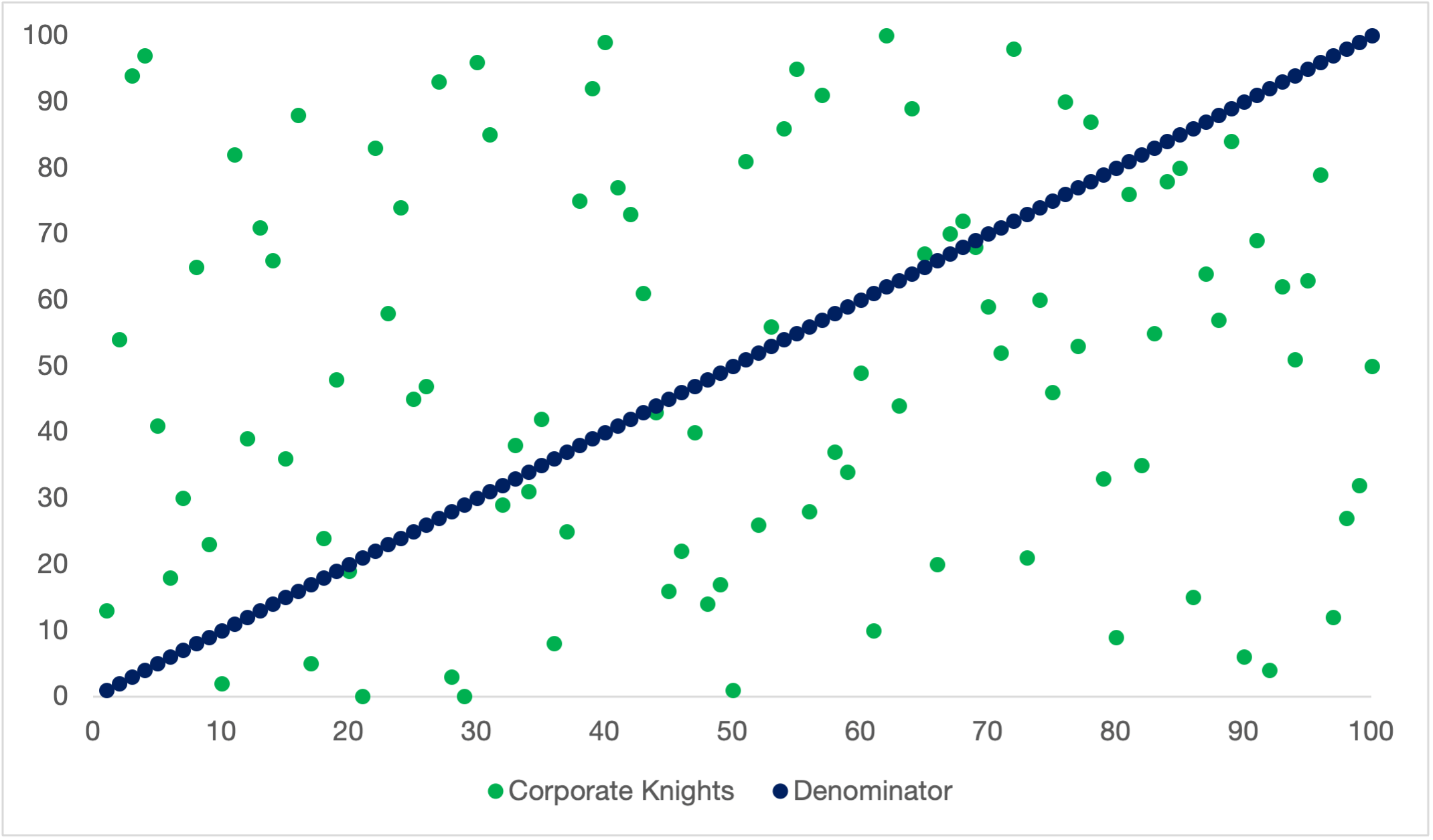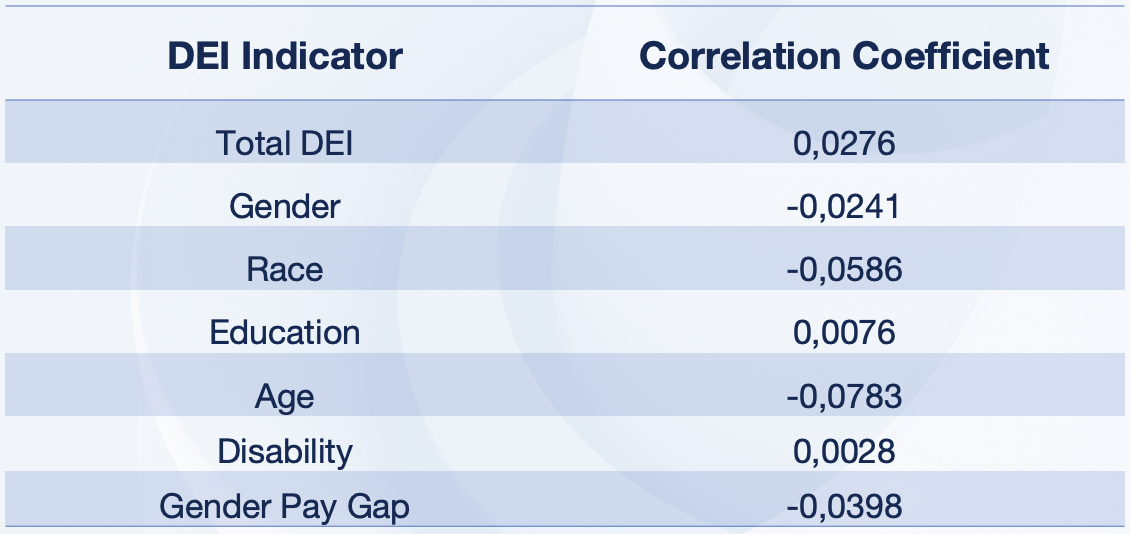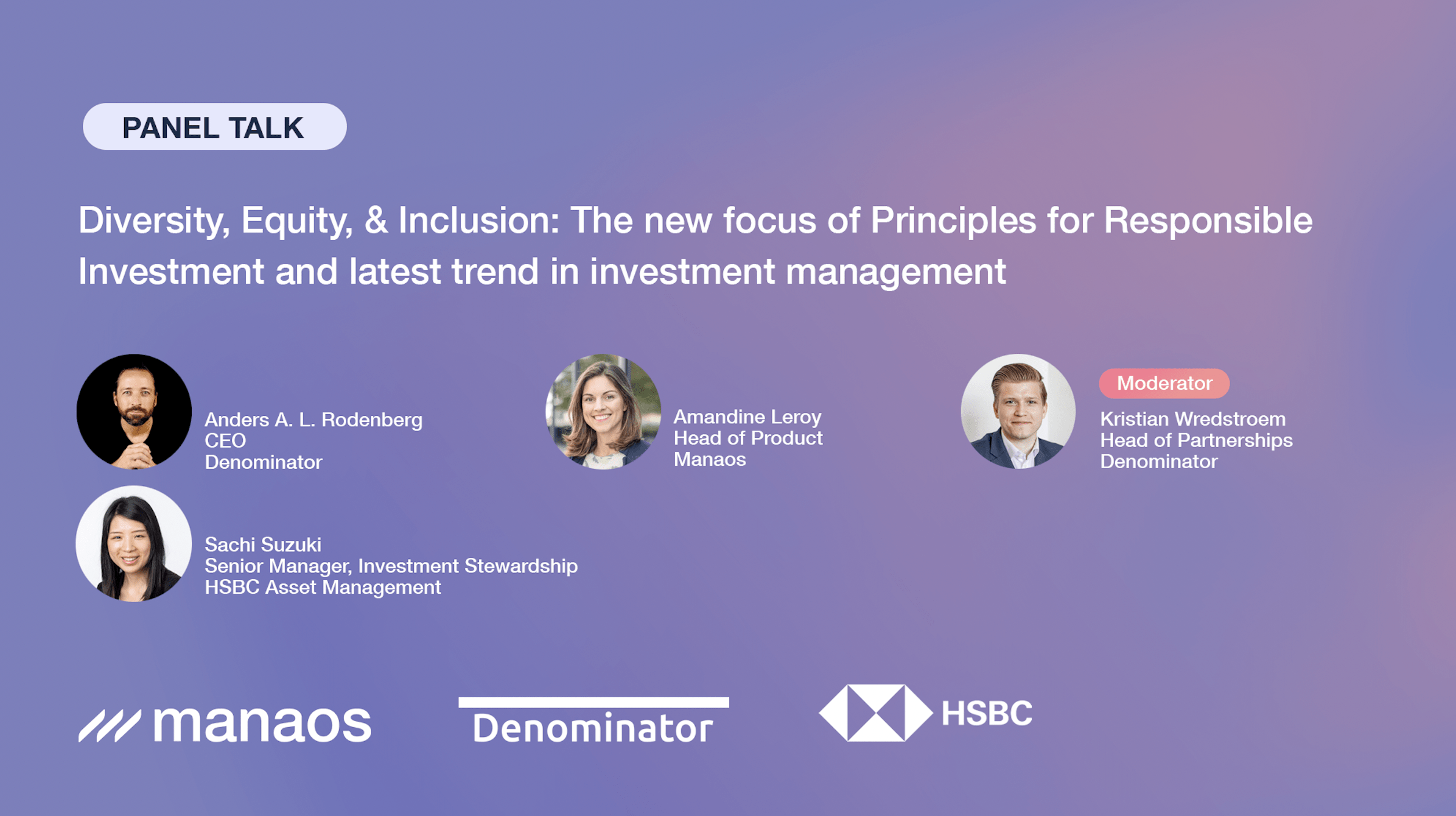Last year, Denominator performed a correlation analysis between the world’s 100 most sustainable companies ranked by Corporate Knights and the same companies ranked by Denominator’s Total DEI Score. The analysis found a very low correlation between the two rankings. On January 18th, Corporate Knights published their 2023 ranking and we ran the same analysis. New year, new data but same result.
Corporate Knights’ performance indicators and weights have changed over the years, and it has been positive to see the 2022 expansion of social performance indicators, such as gender and racial ratio on both executives and the board of directors, plus a supplier score. Still, these social indicators do not weigh equally with the “cleanness” indicators, therefore this ranking is still mostly considered “green” with a strong focus on the environmental aspect of sustainability. In 2022, the social indicators only weighed 20% of the overall sustainability score, while the weights for 2023 are not publicly displayed. It is therefore harder to compare the result from this year in regard to the findings of 2022. However, considering that the result this year greatly correlates with the result from last year, we assume Corporate Knights’ weights are not materially different.
Weaker correlation between Denominator and Corporate Knights’ Rankings
To assess the relationship between Denominator and Corporate Knights’ data, we created a correlation analysis that indicates a very low link between the two rankings, as a relationship is nearly impossible to find. When comparing Denominator’s Total DEI Score with Corporate Knights’ sustainability ranking, the results show a correlation coefficient of 0.03 which is deemed insignificant. In other words, there is no evident correlation between the rankings of Denominator and Corporate Knights.
Moreover, this is in line with the result from the 2022 rankings. For last year’s analysis, the correlation was 0.07. Although the results are insignificant, this indicates that the relationship between Denominator and Corporate Knights’ data and ratings has become even weaker.
Figure 1: Comparison between the rankings

Note: The dark blue dots show Corporate Knights ranking of the world’s 100 most sustainable companies in 2023. The light blue dots show the same companies ranked after Denominator’s Total DEI Score.
If we take a closer look at selected DEI indicators, the findings of a possible relationship are even more inconsistent. In fact, in four out of six DEI indicators, the correlation is negative which suggests a negative relationship. As all correlations are considered insignificant, it indicates that the world’s 100 most sustainable companies on Corporate Knights’ ranking are not necessarily doing as well on selected aspects of DEI. As an example, the company ranking 100th on Denominator’s sub score of Gender is ranked 12th on Corporate Knights’ list.
Table 1: Correlation between Corporate Knights’ ranking and selected DEI indicators

A holistic approach is crucial
Denominator has created the largest standardized database for DEI covering more than 1.7 million public and private companies in 190+ countries, and 85+ industries on 650+ DEI specific data variables. While most DEI research only focuses on a single or two DEI dimensions, typically gender and ethnicity, Denominator takes a holistic approach by incorporating more than 15 DEI dimensions beyond Gender and Race/Ethnicity such as Age, Sexuality, Disability, Education, Nationality, Family, Upbringing, etc.
This comprehensive approach enables a to measure and score on more DEI performance indicators than any other data provider in the market and generate unique insights into the area of DEI. We need a holistic approach, as companies do not necessarily perform equally on all indicators of DEI. As displayed in Figure 2, when measuring Gender, Race/Ethnicity, and education separately, many companies receive different scores depending on the specific Sub Score. Some receive a much higher or lower ranking compared to the measure by the Total DEI Score which includes a holistic approach to the dimensions of DEI. Therefore, when evaluating companies’ DEI performance measuring only the sub scores of e.g., Gender, Race/Ethnicity, or Education can provide misleading results which is why a holistic approach to DEI is crucial.
Figure 2: Comparison of Denominator’s Total DEI Score and selected Sub Scores

New Year, Same Result: Death of ESG – Long live the E, S, and the G
This analysis compared the world’s 100 most sustainable companies ranked by Corporate Knights with the same companies ranked by Denominator’s Total DEI Score. Like the comparison of Corporate Knights’ ranking in 2022, the results showed that the best performing companies on mainly green performance indicators did not necessarily do well on Diversity, Equity, & Inclusion and vice versa. This insight is important and highlights the independence of green performance and DEI performance, as it raises the question of to what extent does it makes sense to have environmental and social aspects in one rating?
If the ESG aggregated acronym is to be kept, many of the existing sustainability rankings or ESG scores would need to better incorporate and calibrate to the social aspect. Sustainability is more than environmental matters – it’s about both people and the planet. However, it can still make sense to perform one sustainability rating but to get a non-biased view one must allocate equal weight to the different aspects of sustainability. DEI is a crucial aspect in the assessment of sustainability and ESG data – and by incorporating more dimensions of DEI data into a ranking, such as the one Corporate Knights performed, it is possible to construct a holistic approach to sustainability. Something that is well needed.
At Denominator, we applaud Corporate Knights for their work with this ranking, and we are open to partnering for bringing even more details to the understanding of sustainability.


